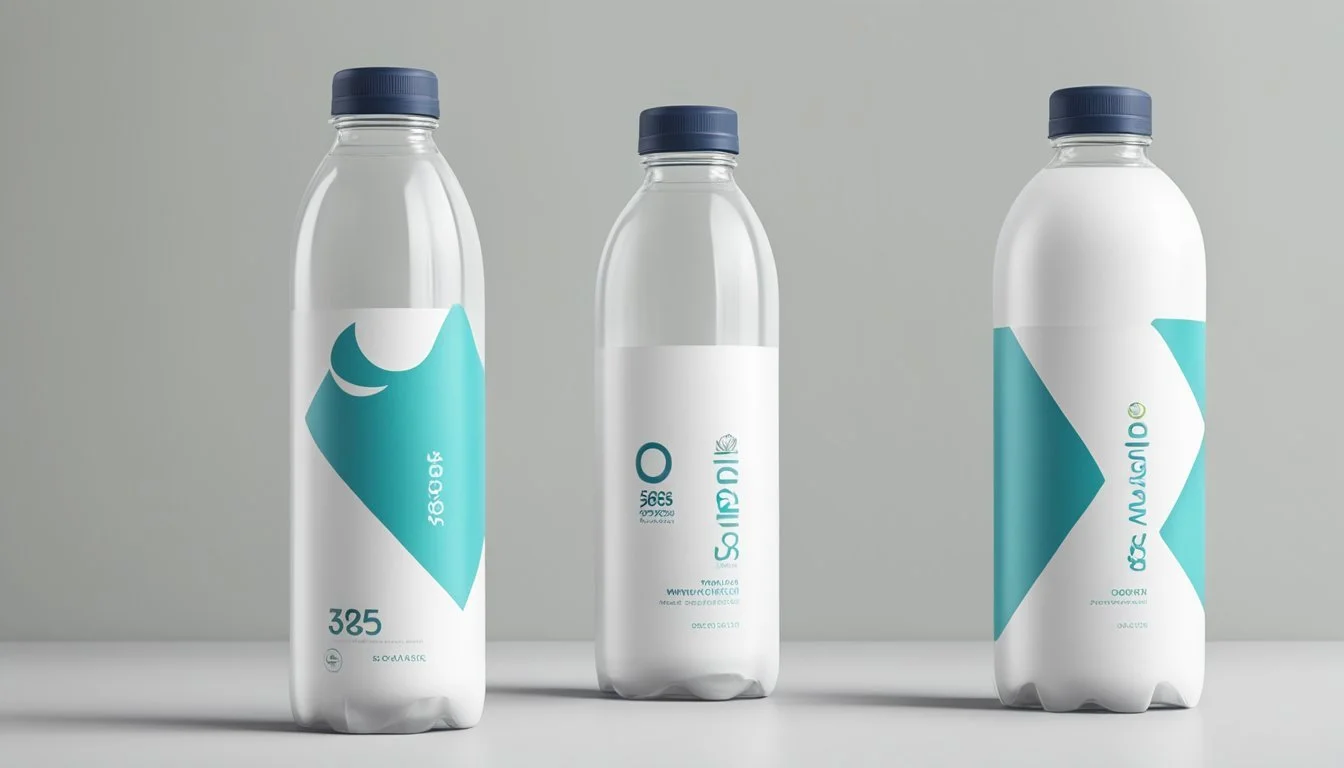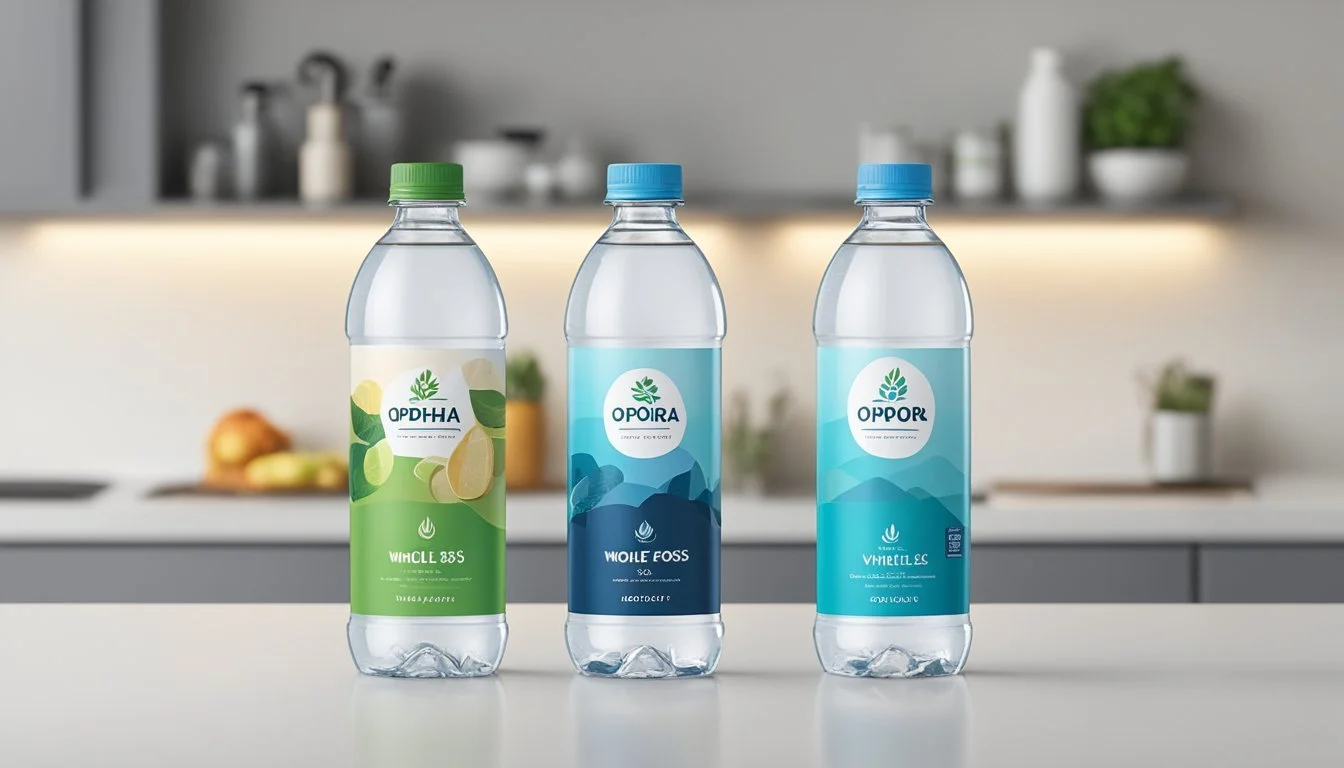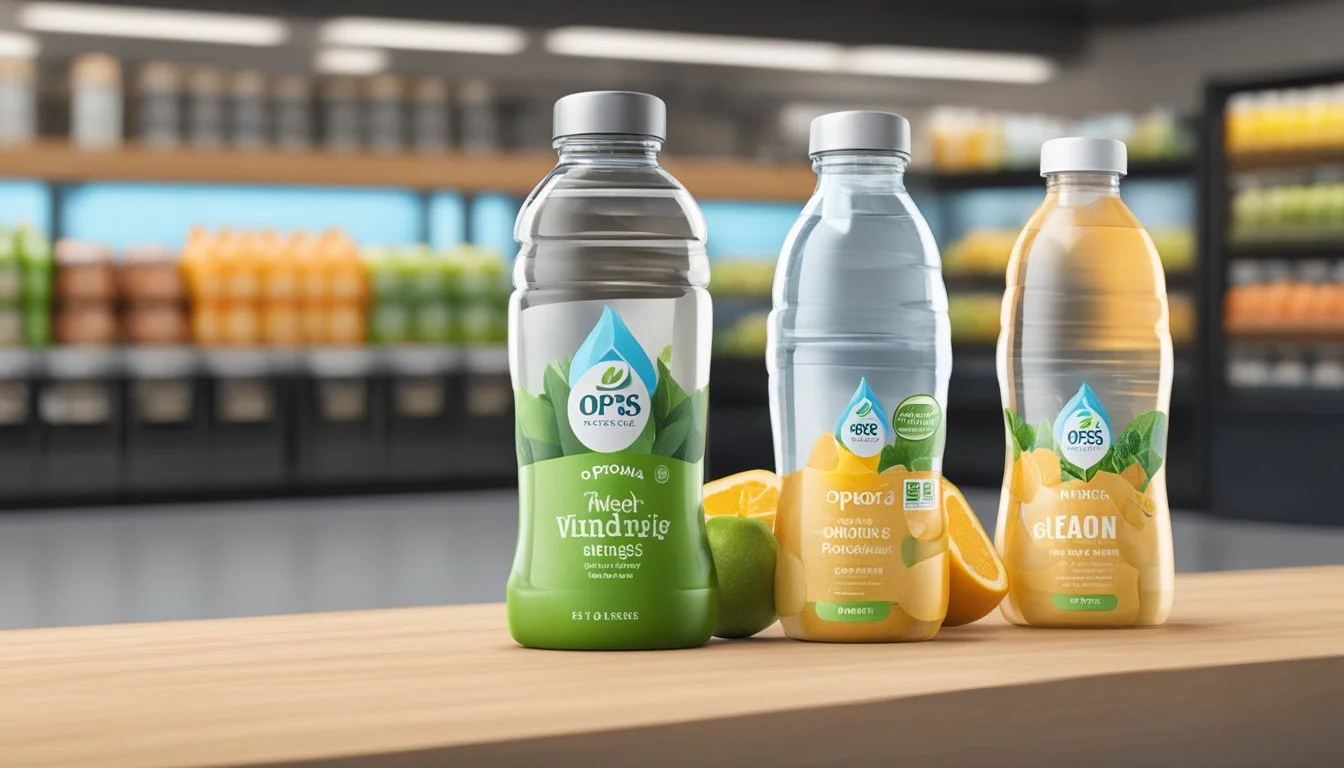Ophora vs. Whole Foods 365
Comparing Bottled Water Quality
Choosing the right bottled water can be a complex decision with so many options available. Two popular choices are Ophora Water and Whole Foods 365. For those who prioritize hydration quality, Ophora Water stands out with its oxygen-rich and ultra-purified composition, often lauded for its health benefits.
Whole Foods 365, on the other hand, offers a variety of bottled waters, including spring, alkaline, and electrolyte options. It is known for being more affordable and easily accessible compared to premium brands like Ophora. Despite mixed reviews about its taste, Whole Foods 365 remains a solid choice for budget-conscious consumers.
Ultimately, the best choice depends on individual preferences and priorities. If superior water quality and health benefits are essential, Ophora Water is the better option. For consumers who need cost-effective daily hydration, Whole Foods 365 provides a practical alternative without sacrificing essential water options.
Understanding Bottled Water
Bottled water comes in various types, each with distinct characteristics. These include spring water, purified water, and drinking water.
Spring water is collected directly from natural springs. It often contains natural minerals, which can affect the taste. For instance, Whole Foods 365 offers spring water that has a typical sweet-sour taste and a dry aftertaste.
Purified water undergoes multiple processes such as reverse osmosis to remove impurities. This type may lack the natural minerals found in spring water, making it taste lighter. Brands like Whole Foods 365 also produce purified water, which can sometimes taste average compared to spring water.
Drinking water is a general category that can include both spring and purified water. It is typically treated to ensure safety and quality.
Water Quality is a critical factor when choosing bottled water. This encompasses purity, taste, and the absence of harmful chemicals. For example, Consumer Reports highlighted concerns about toxic PFAS chemicals in some bottled waters.
Electrolytes and minerals like calcium and magnesium may be added to enhance taste and health benefits. Whole Foods 365’s Electrolyte Water is one such product, ionized to pH 9.5+, offering additional hydration benefits.
Taste and price are additional factors. While some waters like Whole Foods 365’s spring water are cost-effective, their taste might not be as appealing to some consumers. Each type of bottled water offers unique qualities that cater to different preferences and needs.
Overview of Ophora Water
Ophora Water stands out due to its advanced production process, numerous health benefits from its hyper-oxygenated® nature, and its strong environmental commitments. This makes Ophora a premium choice in the bottled water market.
Production Process
Ophora Water employs cutting-edge water technology to ensure the highest quality. Their process removes over 30,000 known contaminants, achieving nano-pure® water quality. This medical-grade water is pH-balanced to 8.0, providing an alkaline option that supports bodily health.
Utilizing stabilization techniques, Ophora Water maintains 40 ppm of oxygen in every bottle. This hyper-oxygenation is a distinctive feature, aimed at enhancing energy levels and overall wellness. The meticulous filtration process results in pure, clean, and refreshing water that meets the highest standards.
Hyper-Oxygenated® Benefits
One of the standout features of Ophora Water is its hyper-oxygenation. This process enriches the water with a high concentration of oxygen, purportedly offering several health benefits. Enhanced oxygen levels in drinking water can improve hydration efficiency, boost energy levels, and aid in faster muscle recovery after exercise.
The pH-balanced quality also contributes to maintaining optimal bodily functions. Consumers report feeling more energized and better hydrated compared to regular bottled water. Given these factors, Ophora Water is often considered a premium choice for health-conscious individuals.
Environmental Commitments
Ophora Water is not only focused on health benefits; it also emphasizes environmental responsibility. The company employs sustainable practices in its production processes to reduce its carbon footprint. Ophora's commitment to the environment includes using eco-friendly materials in packaging and promoting recycling.
Their advanced filtration systems also ensure minimal waste and energy consumption. This dedication to sustainability appeals to consumers who are concerned about the environmental impact of bottled water. By choosing Ophora, customers can enjoy high-quality hydration while supporting eco-friendly practices.
Whole Foods 365 Water Examined
Whole Foods 365 bottled water comes in various types, each with distinct features regarding source, filtration, quality, and pricing. Understanding these aspects helps differentiate them in the crowded market of bottled water.
Source and Filtration
Whole Foods 365 offers different types of water, including spring, electrolyte, and alkaline variants. The spring water originates from natural springs, while the electrolyte and alkaline variants are processed for added minerals and a higher pH level.
Spring Water: Sourced directly from natural springs, often located in pristine environments.
Electrolyte Water: This type undergoes a filtration process that adds essential minerals like potassium and magnesium.
Alkaline Water: Ionized to achieve a higher pH, typically around 9.5, for those seeking a less acidic option.
Considering water sources and filtration methods ensures the right choice for individual needs.
Quality and Safety Standards
Whole Foods maintains strict quality and safety standards for its 365 water line. All bottled water must comply with FDA regulations and EPA standards, ensuring it is safe for consumption.
The water undergoes rigorous testing for contaminants including lead and arsenic.
PFAS Chemicals: Concerns over the presence of these harmful substances have led to frequent testing. Whole Foods aims to minimize their levels to ensure consumer safety.
Whole Foods' commitment to quality is evident in its transparency and compliance with health and safety standards.
Price and Accessibility
Whole Foods 365 water is competitively priced, making it accessible to a wide range of consumers.
Spring Water costs around $0.69 for a 500 mL bottle, offering cost-effective hydration.
Electrolyte Water is priced at $0.79 for 500 mL. Alkaline Water, given its added health benefits, is slightly higher at $1.29 per liter.
Availability is high at Whole Foods locations, ensuring easy access. The competitive pricing and widespread availability make it a convenient option for many.
Comparative Analysis
Ophora and Whole Foods 365 offer distinct bottled water experiences. The analysis will focus on taste, nutritional content, and packaging.
Taste and Palatability
Ophora water is often praised for its crisp, clean taste, attributable to its advanced purification process that removes impurities. In contrast, Whole Foods 365 spring water has a more neutral profile with a subtle sourness and dry aftertaste, according to a review from the Los Angeles Times. Taste preferences can vary, but those seeking a more refined and fresher taste may prefer Ophora.
Nutritional Content
Ophora water is known for its high oxygen content and added minerals, which some believe offer health benefits. Whole Foods 365 offers a range of waters, including alkaline and electrolyte-infused options. The 365 Everyday Value Alkaline Water has a pH of 9.5+, which some consumers find beneficial for balancing body pH levels. These differences can cater to varying health and wellness priorities.
Packaging and Sustainability
Ophora uses environmentally friendly packaging, often employing glass bottles which are fully recyclable and reduce plastic waste. Whole Foods 365 water is packaged in recyclable plastic bottles, but this can still contribute to environmental concerns related to plastic usage. For environmentally conscious consumers, Ophora's packaging may be more appealing, although Whole Foods 365 does make efforts to ensure their bottles are sustainably produced.
Combining taste, nutritional benefits, and packaging, consumers can make a more informed choice between Ophora and Whole Foods 365 based on their priorities and preferences.
Health and Wellness Considerations
To evaluate the health benefits and safety of drinking Ophora versus Whole Foods 365 bottled water, it's essential to consider factors such as hydration, contaminants, and chemicals present in each option.
Hydration and Body Health
Ophora water, renowned for its high oxygen content, claims to provide enhanced hydration, which can be beneficial for body health.
High oxygen content might improve cellular hydration, potentially impacting overall wellness positively. Whole Foods 365 offers various water types, such as alkaline and electrolyte-infused options, which cater to different hydration needs.
While all water aids hydration, the additional electrolytes in Whole Foods 365’s offerings can help maintain proper bodily functions, especially after physical exertion.
Contaminants and Chemicals
Both Ophora and Whole Foods 365 aim to offer safe drinking water, but it's also important to evaluate the presence of contaminants like heavy metals or chemicals such as PFAS (per- and polyfluoroalkyl substances).
Ophora employs extensive purification methods to minimize harmful substances, promoting a cleaner water profile.
Whole Foods 365, although more affordable, comes under scrutiny for its plastic packaging, which may leach chemicals over time.
Consumers seeking the healthiest choice might prioritize Ophora for its stringent purification practices, despite the higher cost.
Market Perspectives
The comparison between Ophora and Whole Foods 365 bottled water brands extends beyond taste and quality. Consumer preferences, industry standards, and economic impacts play pivotal roles in shaping the market dynamics.
Consumer Preferences
Consumers often consider several factors when choosing bottled water. Ophora is known for its oxygenated and mineral-rich content, appealing to health-conscious individuals. Whole Foods 365, on the other hand, offers a variety of options like alkaline, electrolyte, and spring water, attracting a diverse customer base. Price sensitivity also influences purchasing decisions. For instance, Whole Foods 365 has budget-friendly options, with prices ranging from $0.69 to $1.29 per bottle. In contrast, Ophora is positioned as a premium brand, which may limit its market to consumers willing to pay more for perceived health benefits.
Industry Standards and Regulations
Both brands are subject to regulations established by the Food and Drug Administration (FDA) and the Environmental Protection Agency (EPA). The International Bottled Water Association (IBWA) also provides voluntary guidance on quality standards. These standards ensure the safety and purity of bottled water. Whole Foods 365 adheres strictly to these regulations, offering transparency about its source and production methods. Ophora emphasizes its advanced purification process and oxygenation technology, aligning with FDA and EPA requirements. States may enforce additional guidelines, impacting distribution and sales strategies for both brands.
Economic Impact
The bottled water industry significantly impacts the economy through sales revenue and job creation. Whole Foods 365 benefits from the extensive retail network of Whole Foods Market, driving higher sales volumes due to broader accessibility. This brand strategy supports competitive pricing and potentially higher market share. Ophora, with its premium positioning, attracts less volume but potentially higher profit margins per unit. The economic footprint of these brands includes contributions to local economies where bottling plants operate and the broader supply chain, encompassing distribution, retail, and recycling sectors. The environmental considerations also play a role, as sustainability efforts can influence consumer loyalty and long-term economic viability.
Conclusion
Ophora Water offers a range of luxury bottled waters that promise high levels of purity. The brand emphasizes advanced filtration techniques and a focus on oxygenation, making it suitable for those willing to invest in premium hydration. It can be a fitting choice for both home and office settings where quality is paramount.
Whole Foods 365, on the other hand, provides affordable options without compromising on basic water quality. Their spring and electrolyte waters meet everyday hydration needs. With a budget-friendly price tag, these options are accessible to a broader audience.
Comparison Table:
Feature Ophora Water Whole Foods 365 Price Range High Low to Mid Purification Process Advanced (Micro-Filters, Reverse Osmosis, Oxygenation) Basic Filtration Target Audience Luxury, Health-Conscious General Consumers
Consumers must consider their specific needs. If luxury and advanced filtration are priorities, Ophora Water stands out. For everyday hydration at a reasonable cost, Whole Foods 365 is a worthy option. Both brands fulfill different niches effectively in the bottled water market.
More About Ophora
Mountain Valley Spring Water vs Ophora: Which Bottled Water is Better?
Ophora vs Kirkland Signature: Which Bottled Water is Better?
Richard's Rainwater vs Ophora: Which Bottled Water is Better?
Whole Foods Italian Still Mineral water vs Ophora: Which Bottled Water is Better?
More About Whole Foods 365
Acqua Pana vs Whole Foods 365: Which Bottled Water is Better?
Alkaline88 vs Whole Foods 365: Which Bottled Water is Better?
Antipodes vs Whole Foods 365: Which Bottled Water is Better?
Aqua Carpatica vs Whole Foods 365: Which Bottled Water is Better?
Arrowhead vs Whole Foods 365: Which Bottled Water is Better?
Big Chill vs Whole Foods 365: Which Bottled Water is Better?
Boxed Water vs Whole Foods 365: Which Bottled Water is Better?
Cascade Mountain vs Whole Foods 365: Which Bottled Water is Better?
Castle Rock vs Whole Foods 365: Which Bottled Water is Better?
Core Hydration vs Whole Foods 365: Which Bottled Water is Better?
Crystal Geyser vs Whole Foods 365: Which Bottled Water is Better?
Deer Park vs Whole Foods 365: Which Bottled Water is Better?
Hawaii Volcanic vs Whole Foods 365: Which Bottled Water is Better?
Hawaiian Springs vs Whole Foods 365: Which Bottled Water is Better?
Ice Mountain vs Whole Foods 365: Which Bottled Water is Better?
Icelandic Glacial vs Whole Foods 365: Which Bottled Water is Better?
Just Water vs Whole Foods 365: Which Bottled Water is Better?
Liquid Death vs Whole Foods 365: Which Bottled Water is Better?
Mountain Valley Spring Water vs Whole Foods 365: Which Bottled Water is Better?
Nestle Pure Life vs Whole Foods 365: Which Bottled Water is Better?
Open Water vs Whole Foods 365: Which Bottled Water is Better?
Poland Spring vs Whole Foods 365: Which Bottled Water is Better?
Pure Life vs Whole Foods 365: Which Bottled Water is Better?
Purely Sedona vs Whole Foods 365: Which Bottled Water is Better?
Richard's Rainwater vs Whole Foods 365: Which Bottled Water is Better?
San Pellegrino vs Whole Foods 365: Which Bottled Water is Better?
Simple Truth vs Whole Foods 365: Which Bottled Water is Better?
Smartwater vs Whole Foods 365: Which Bottled Water is Better?
Solan de Cabras vs Whole Foods 365: Which Bottled Water is Better?
Talking Rain AQA vs Whole Foods 365: Which Bottled Water is Better?
Topo Chico vs Whole Foods 365: Which Bottled Water is Better?
Weird Water vs Whole Foods 365: Which Bottled Water is Better?
Whole Foods 365 vs 1907water: Which Bottled Water is Better?
Whole Foods 365 vs BodyArmor: Which Bottled Water is Better?
Whole Foods 365 vs CBD Living: Which Bottled Water is Better?
Whole Foods 365 vs Crystal Lake: Which Bottled Water is Better?
Whole Foods 365 vs Essence pH10: Which Bottled Water is Better?
Whole Foods 365 vs Kirkland Signature: Which Bottled Water is Better?
Whole Foods 365 vs Proud Source: Which Bottled Water is Better?
Whole Foods Italian Still Mineral water vs Whole Foods 365: Which Bottled Water is Better?
Zephyrhills vs Whole Foods 365: Which Bottled Water is Better?





